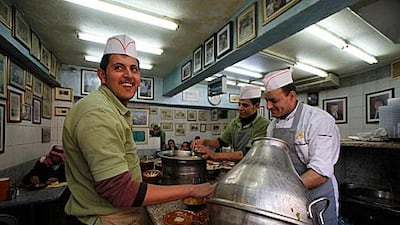AMMAN // Just about everything at Hashem Restaurant exudes the grittiness of this city's rough-and-tumble downtown.
Its chairs and tables are made of flimsy plastic. Its falafel and fresh pitta bread are not even served on proper plates: instead, they come on sheets of paper.
Nor are its mustachioed waiters heavy on the charm. They hurriedly guide customers to tables, if there are any, and then barely seem to listen when orders are placed.
But the high-end eateries springing up across Amman cannot match Hashem's reputation.
It has a near-cult following among locals and foreigners. Its clientele includes stopovers by Jordanian kings and queens. And it has weathered its fair share of political upheaval.
"This is the most popular falafel place in town," said Amr Siam, 30, a Jordanian visiting from his oil-industry job in Saudi Arabia.
Employees put its popularity down to speedy service, low prices and, most importantly, its one-of-a-kind recipes.
These were brought over five decades ago by the restaurant's Palestinian founder, Hashem Turk, from his family-owned restaurant in Jaffa, on the Mediterranean coast in what is now Israel, just south of Tel Aviv.
Yet its menu is like that of just about any hummus and falafel restaurant, where chefs in white aprons scoop fuul (fava beans) out of vase-shaped metal jars and plop it on to plastic bowls, or whip up extra tangy hummus mixed, on request, with extra chickpeas and tahine.
And few seem able to pinpoint what makes Hashem different from its many competitors.
His sleeves rolled up, Mr Siam was devouring bowls of fuul, onions and pickles when asked what, exactly, explained Hashem's allure.
Was it the food?
"It's actually not great," he said, scooping a hefty amount of beans from a bowl with a torn piece of pitta.
Was it the selection?
"Hummus and fuul! What else can I order?" said Bassem Abu Baker, 38, an unemployed Jordanian who sat across the table from Mr Siam.
That was not exactly a ringing endorsement, but then again, it probably does not matter.
Customers have practically been storming Hashem since its founding in 1956, according to Nour Shiab, 54, the restaurant manager.
"We've never once had to advertise ourselves," he said. "It's the people who do it for us."
He should know. For 42 years, Mr Shiab, a jack-of-all-trades, has been preparing food and organising shifts at Hashem. He was 12 when he first started bussing tables.
He said he had practically seen it all while working here: wars, attempted revolutions and counter-revolutions.
He recalled watching from inside the restaurant a pitched battle between Jordanian forces and Yasser Arafat's Palestine Liberation Organisation guerrillas one evening in 1970.
That fighting, known as Black September, ultimately left thousands dead and led to Arafat's expulsion to Lebanon.
Throughout it all, however, Hashem has kept its doors open.
"We had to," Mr Shiab quipped, "because we don't actually have a door."
Indeed, the restaurant has no need for one since it operates non-stop, 24/7.
In some ways, it seems a gateway for bridging the city's well-off west end and its poorer eastern neighbourhoods.
Located close to the intersection of east and west Amman, residents from both sides can be found congregating here in large numbers after Friday prayers.
And many an Arab celebrity has passed through Hashem, too, their visits documented by the dozens of photos displayed on its walls.
Mr Shiab recalled Hashem's most distinguished guest, Jordan's ruler, King Abdullah II, who paid an unexpected midnight visit during Ramadan three years ago, chatting with customers and shaking hands.
"He sat right over there," Mr Shiab said proudly, pointing to a nondescript table in the restaurant's outdoor pavilion.
More recently, his customers have come from the burgeoning protest movement calling for curbs to the king's powers.
They can't seem to resist Hashem's inexplicable charm, either, and regularly pass by after Friday rallies for plates of tangy hummus, washed down with warm, sugary glasses of minted tea.
While the growing force of demonstrations have unsettled many Jordanians, including Mr Shiab and fellow employees at Hashem, he said that protesters were welcome.
For one thing, they are "good for business".
"We're open to anyone," he said.
* With additional reporting from Suha Philip Ma'ayeh
Follow
The National
on
& Hugh Naylor on

